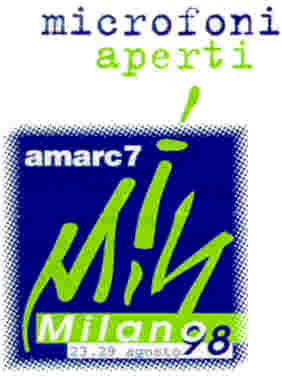amarc-4
[Date Prev][Date Next][Thread Prev][Thread Next][Date Index][Thread Index]
<amarc-4> Community Radio and NICTs
Dear Colleagues.
My first contribution to the list...I'll write in English. I work with
a regional development communications and information NGO called EcoNews
Africa, which is based in Nairobi, on the community media programme. My
work includes the facilitation/coordination of an east African project
which is establishing three community radio stations in Kenya, Tanzania
and Uganda. The project also has a connectivity component and I've
therefore followed the discussion by Ndiaye and Delorme with some
interest.
We are also part of an African NGO consortium which includes the
AMARC-Africa office, the Media Institute of Southern Africa (MISA), the
National Community Radio Forum (NCRF) of South Africa, Inter Press
Service (IPS) and the Panos Institute-Lusaka. The consortium is in the
process of concluding a study on the actual and potential use of NICTs
by community radio stations in east and southern Africa. I think some
of the research findings would be useful to this discussion. I've
copied this message to two other consortium members in case they're not
already on the list, one of whom, John Barker, will be in Milan with us.
The person concluding the research, David Lush, can probably talk more
about this, but I think at this point, the question for us really is not
the potential application of NICTs by community radio in Africa, but
rather, why that potential is not being reached.
With the east African project, a key question has been what to do to get
connected in the absence of phone lines and power. Solar is an obvious
power alternative. But the lack of corporate investment in (or even
simple consideration of) what we consider a medium term solution, HF and
VHF radio connectivity is a real barrier. Information on successsful
applications is hard to access, as is information on how it
technologically works. The number of ISPs offering this option is
extremely low and their costs are extremely high. Plus, so far, the
technology works best for data transfer. Satellite is another solution,
but given the slow and manipulated pace of regulatory change in
telecommunications, it is a long term solution.
Apart from regulatory and technological barriers, there's also the
barrier posed by the real information needs of (especially) rural
communities. The three groups we work with see connectivity (through HF
radio) firstly as a means to better communicate (through email) with
each other and others (ie. as an alternative to phones) and secondly, as
a means to finally access information from a diverse range of sources
outside of their communities. This is good of course. But the other
side of the story is how important their
information/analysis/interpretations of their lives is to those outside
of those communities. This is the real challenge for us at this point.
Using NICTs consistently as part of local organizing/advocacy work.
In light of this, I hope this discussion will bring us to 1) concrete
ideas about collectively addressing the regulatory and appropriate
technologies 2) concrete ideas about training to ensure NICTs aren't
just seen as a means of accessing information, but also of disseminating
and mainstreaming marginalized (even within Africa) perspectives.
Regards to all.
Lynne Muthoni Wanyeki
Programme Officer, Community Radio
EcoNews Africa
P O Box 76406
Nairobi
Kenya
Tel: (254) 2-7210767/99
Fax: (254) 2-725171
Email: [email protected]
++++++++++++++++++++++++++++++++++
AMARC 7 Foro Virtual Forum Virtuel
http://www.amarc.org/amarc7
to unsubscribe / pour se desabonner / para abandonar :
e-mail "unsubscribe amarc-4 " to: [email protected]
Tecnical realisation, scripting and archiving: Worldcom
Foundation
English: [Virtual
Forum Index] [Search
Forum archives]
Français: [Index
du Forum Virtuel] [Chercher
dans les archives du Forum]
Español: [Índice
del Foro Virtual] [Buscar
en los archivos del Foro]
